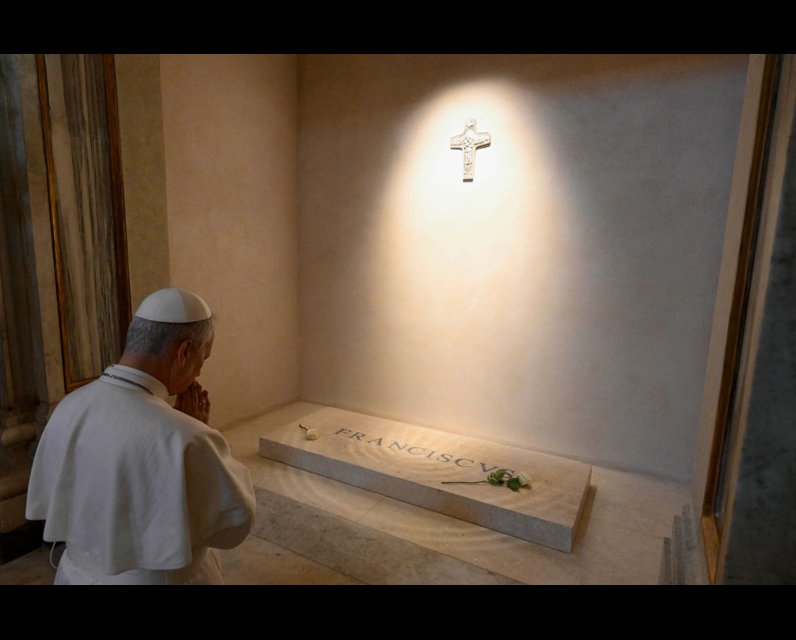Source Feed: Walrus
Author: Randy Boyagoda
Publication Date: July 3, 2025 - 06:30
The Harshest Critic of AI Might Be Pope Leo XIV
July 3, 2025

What does the new pope think of artificial intelligence? Curiosity led me to ask the technology itself, in this case a program called Perplexity. Here’s part of its answer, at least on an afternoon in early June 2025:
Pope Leo XIV, the new pope as of 2025, views artificial intelligence (AI) as one of the most critical challenges facing humanity today. In his first formal audience at the Vatican, he explicitly identified AI as a major concern, highlighting the threats it poses to human dignity, justice, and labor conditions. He sees AI as a disruptive force that requires ethical oversight to ensure it benefits humanity rather than undermines human values such as compassion, mercy, morality, and forgiveness.
I find AI-generated prose deadening in its blandness and neutrality, but in this instance, I don’t mind it, not least because the entity is presenting a view critical of its very existence and purpose. But who knows what this same program might yield if I ask it in an hour, a day, a week? We might call this evidence of AI’s dynamism, of its constant growth, of its capacity not just to replicate or compete with human thinking but instead to enact its own distinctive cognitive activity. But this is also a changeableness that attests to its inconstancy and inconsistency—a lack of reliability, durability, and stability that can’t be measured and trusted for more than a moment, never mind for millennia.
For thinking that provides the latter, look to the Catholic Church. For many, this is exactly evidence of the Church’s regressive presence in twenty-first-century life. But when it comes to our ongoing ambivalence about the reach and potential of AI, Catholicism offers an abiding clarity drawn from its own resources in advocating for human dignity, identity, and purpose. While the Church has both promoted and interrogated the goods of technology for centuries—yes, there was the Galileo affair, but the Church has also been directly involved in astronomy and cosmological research since the late sixteenth century—it’s doing so in fresh and needed ways in this present moment. That’s because the most-discussed new actor in global affairs, Chicago-born, one-time undergraduate math major Robert Prevost, might have been inspired as much by Catholic traditions as he was by the rise of AI in the very name he chose as pope.
Shortly after the new pope was introduced to the world, a Vatican spokesman explained that the former Cardinal Prevost chose his papal name to signal his fidelity to Leo XIII, who served from 1878 until his death in 1903. Observers wondered if he was also invoking another predecessor: Leo I—Leo the Great—whose papacy from 440 to 461 left a profound mark on the Church and the wider world. But in his first remarks on the matter, Leo XIV only confirmed the official association. By many accounts, the new pope is a reserved and humble man; it’s no surprise he’d demur from any link with a pope called “great,” never mind as the first American pope, during this chaotic, incoherent, ongoing era to Make America Great Again.
As for Leo XIII, he’s best known, today, for inaugurating the modern tradition of Catholic social teaching. He applied the Church’s thinking about the God-given dignities and rights of every human person—particularly wage workers and the poor—against the powers of industry, corporations, and the state. Leo made the decisive case for this with the 1891 publication of Rerum Novarum, an encyclical that, as Leo XIV explained in his first formal address to the cardinals, “addressed the social question in the context of the first great industrial revolution.”
In turn, Leo XIV declared that we are in the midst of nothing less than another industrial revolution and singled out AI as “pos[ing] new challenges for the defence of human dignity, justice, and labour.” Addressing the world’s media two days later, Leo XIV again raised the question of AI, acknowledging its “immense potential” but also warning that this potential carries with it the grave responsibility “to ensure that it can be used for the good of all.”
No kidding.
As in, so what that the new pope is pointing this out?
Obviously, Leo XIV isn’t the first person to raise concerns about AI. University of Toronto professor emeritus and 2024 Nobel laureate Geoffrey Hinton, often described as the “Godfather of AI,” has for some time now been one of the most prominent critics of the technology’s seemingly unchecked rise in all areas of life. Indeed, Leo XIV’s not even the first pope to worry about AI. Pope Francis raised many concerns about it during his papacy; he addressed the 2024 G7 summit on the subject, last June, in Puglia, Italy, calling it “an exciting and fearsome tool,” particularly worrisome in the areas of warfare and law.
Francis also pointed to the ways in which intensifying interactions with AI programs could have erosive effects on individual people, on their psyches and bodies. Francis made similar points at Davos this past January and, later that same month, the Vatican released a document entitled Antiqua et Nova: Note on the Relationship Between Artificial Intelligence and Human Intelligence. It argues that although the rise of AI puts “[t]he vast expanse of the world’s knowledge” at our fingertips, we risk becoming “humanly or spiritually barren” unless we move “beyond the mere accumulation of data and strive to achieve true wisdom.”
There’s no daylight between Leo and Francis on these points, and we are a considerable distance from recent Catholic enthusiasms for digital technology, typified by the work of Vatican-based Jesuit priest Antonio Spadaro, a prominent cyber-theologist during the Francis papacy whose sophisticated musings on the spiritual possibilities made possible by the age of the internet now feel very dated. Indeed, I would predict Leo would more readily agree with Hinton about the perils of AI, while occupying a middle ground between profit- and progress-seeking amoral enthusiasts and total doomsters.
But what Pope Leo has done, with his making AI such a privileged concern at the onset of his papacy, alongside concerns about migrants and the victims of war in Gaza and Ukraine and elsewhere, is to challenge and invite people, Catholic or otherwise, to consider more deeply what it means to be a believing, thinking, and acting person. Leo’s perspective, rooted in centuries of reflection, is guided by the conviction that this meaning is transcendent. Put differently, Leo is at the helm of a faith that holds that God chose to become a mortal human being in order to redeem humanity from that very mortality. As such, the pope regards AI as a threat to human life in ultimate terms.
At first glance, this doesn’t necessarily make him different from Daniel Kokotajlo, the one-time OpenAI employee turned worst-case predictor who contributed to a report claiming AI could dominate and then destroy human life by 2030. What does set the pope’s concerns apart, however, is that as a religious leader, he regards thinking machines as a threat to our souls. As shepherd to 1.4 billion Catholics and a messenger of hope and love to all people of goodwill, he has a duty of care for humanity that’s unlike anyone else’s who’s currently worrying about AI.
Here, among others, are the now-standard areas of concern about the technology: its substitution of hyper-efficient and completed formulations of knowledge for patient, rigorous, open discovery; its increasing threat to an array of human work and to human workers, blue and white collar alike; the ecological implications of the immense energy AI requires; its impact on basic information, from current news to decision making in areas like health care, transportation, law enforcement, military affairs, and politics; how it understands truth, both as a factual claim and as a higher-order insight into the nature of reality.
Across all of this, people worry that AI is coming into possession of agency and autonomy beyond human control and even conceiving. Understandably, many feel overwhelmed or reactive—or both—in response. Examples are many: an AI-generated summer-reading guide to books that don’t actually exist; an AI-generated image of Donald Trump as pope in the lead-up to the conclave; a video message to Ibrahim Traoré, in which the new pope warmly affirmed the ideas and priorities of the coup-leading, militaristic, and authoritarian leader of Burkina Faso—a message the Vatican confirmed was faked with AI.
Against this churn of direct challenges to our sense of self and world, to our very individual and collective well-being, where might we find higher perspective? Unlike any other institution or role, the Catholic Church and papacy credibly offer as much. Christians hold that God has invited human beings to be co-creators in a Divine Plan, and that we have a distinct and singular role to play in shaping the world—through the interplay of creativity, responsibility, and moral action. Technology that doesn’t simply enhance those co-creator capacities but renders them unnecessary, even obsolete, leads to a loss of individual dignity (not to mention undermines our earthly journey toward eternal life). It’s the mission of the Church and the papacy to convey these things in ways that speak to as many people as possible, ordinary and elite alike.
It’s early days in the papacy of Leo XIV, and until he offers more out of his own, we can turn to Leo XIII’s work Rerum Novarum and find formulations that readily speak to the promise and peril of AI. The encyclical doesn’t just set forth reactionary rulings, as we might expect from a document from an authoritative global religious leader that’s more than a century old. Instead, it offers a supple and inviting way to think through what it means to be human during a tumultuous and inhumane time:
[N]o artifice will ever succeed in banishing from human life the ills and troubles which beset it. If any there are who pretend differently—who hold out to a hard-pressed people the boon of freedom from pain and trouble, an undisturbed repose, and constant enjoyment—they delude the people and impose upon them, and their lying promises will only one day bring forth evils worse than the present.
AI evangelists promise the technology will make our lives easier and more efficient, but here Pope Leo XIII—and, I suspect, by extension, the American who now shares his papal name—cautions that anyone promising untold goods born of expansive technology “will only one day bring forth evils worse than the present.” Echoing many of today’s concerns about AI, Rerum Novarum urges us “to look upon the world as it really is.” Lasting comfort, it suggests, lies beyond this world—for as the encyclical goes on to say, we must “seek elsewhere . . . for the solace to its troubles.”
Whether you’re Catholic or not, a believer or not, the invitation to find inspiration and reason for a meaningful life beyond the barely lifelike and finally sterile imitations of existence—nowhere clearer than with synthetic cognition itself—can and should be a source of provocation, even consolation. The post The Harshest Critic of AI Might Be Pope Leo XIV first appeared on The Walrus.
Quebec Premier François Legault told the news conference the electricity deal is a positive sign for an industry that has been hit by 50 per cent tariffs on imports to the U.S.
July 4, 2025 - 15:52 | Alessia Simona Maratta | Global News - Canada
OTTAWA — Natural Resources Minister Tim Hodgson did not commit to scrapping Trudeau-era climate policies that Alberta and Ontario want to see gone but said that the newly adopted major projects bill could pave the way to doing so “over time.”
Speaking in Calgary on Friday, Hodgson said the new legislation — which enables the cabinet to quickly approve projects of national interest by overriding federal laws — will empower the government to act swiftly and any legislative fine-tuning would come later.
“We need to move quickly. What the… One Canadian Economy Act does is allows us to...
July 4, 2025 - 15:42 | Catherine Lévesque | National Post
OC Transpo saw its highest ever single-day ridership on the O-Train Line 1 on Canada Day with approximately 246,000 customer trips. Read More
July 4, 2025 - 15:32 | Aedan Helmer | Ottawa Citizen




Comments
Be the first to comment